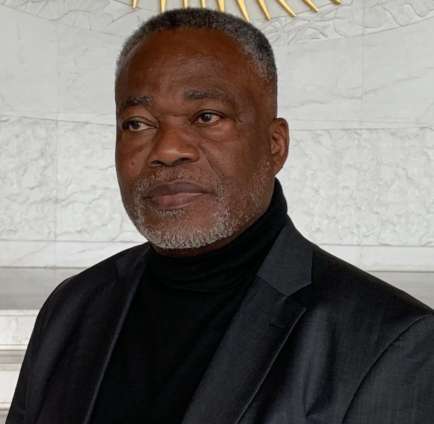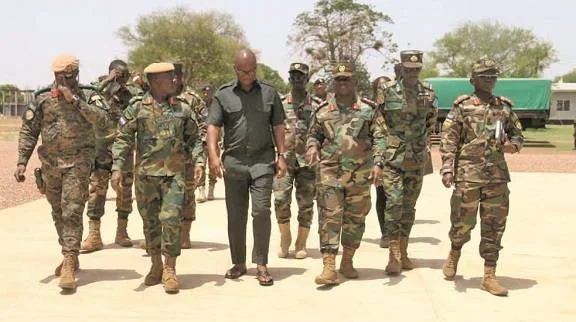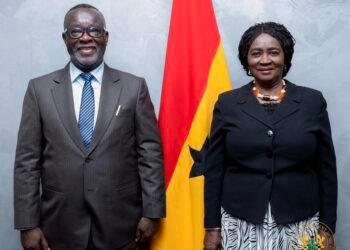The Bawku conflict has once again become a focal point of Ghana’s national security discourse, as analysts question the adequacy and direction of government responses.
The escalation of violence, marked by targeted killings of students and attacks on military convoys, has shifted the terrain of the conflict.
In this context, Col. Festus Aboagye (Rtd), a respected security expert, offered a detailed critique of the government’s strategy, while also affirming the legitimacy of adjusting tactics in response to evolving threats.
According to Col. Aboagye, it is misleading to describe the government’s approach as merely reactive.
“It’s appropriate that the government takes appropriate measures. However, I think we all need to understand that there has never been peacekeeping in Bawku. And I’ve always said that we must not use terminologies that do not apply.
“The term of peacekeeping is not of global application to all manner of conflicts. Bawku is an inter-ethnic conflict in a democracy. So the state now needs to find room for the armed forces to deploy, one, within the laws of the country, and two, subject to international law.”
Col. Festus Aboagye (Rtd)
Accordingly, he argued that shifts in tactical methods are warranted when on-the-ground conditions change significantly.

These changes include the broadening geographical scope of the conflict, the deliberate targeting of vulnerable populations such as schoolchildren, and increasingly aggressive attacks on state security forces. The rising volatility, in his view, justifies a strategic recalibration.
He stressed that while the terminology of “peace enforcement” has been floated by some, it too may be an inappropriate characterization.
The real task, he emphasized, is restoring stability, and that can be achieved through well-planned internal security operations without needing to invoke language associated with foreign intervention or civil war scenarios.
Troop Strength, Logistics Key In Bawku Conflict
As the conversation shifts to operational effectiveness, Col. Festus Aboagye raised concerns about the sufficiency of troop levels currently deployed.
Since late 2023, following the contested installation of a rival Bawku chief, the government has maintained a task force strength of about 500 personnel.
Eighteen months into the deployment, he questioned whether this force was adequate given the growing complexity and severity of the crisis.

“Can we, for instance, increase it by another 500 to 1,000, or 1,000 to 1,500, or even 2,000?” he asked rhetorically, underscoring the importance of physical dominance in conflict zones.
He argued that the ability to dominate a terrain largely hinges on manpower and physical presence—what military professionals call “boots on the ground.”
“Secondly, there have been occasions in the past when the military was using coupons, fuel coupons, to draw fuel to be paid for by the government, and the government was not paying. The fuel suppliers, who were not charities, redrew the service.”
Col. Festus Aboagye (Rtd)
Given these constraints, he advocated for a significant boost in logistical support, calling for more transport vehicles, especially armored ones, and an adequate and reliable fuel supply.
These resources, he argued, are critical to sustaining a high-functioning task force capable of managing conflict hotspots, responding rapidly to threats, and deterring aggressors.
He further emphasized the urgent need to strengthen military intelligence operations.
A series of successful ambushes and attacks on military convoys suggests not only an emboldened opposition but also significant gaps in intelligence gathering and interpretation. “Once the convoy was attacked and the state didn’t see it coming, it reflects a troubling intelligence deficit,” he warned.

Col. Aboagye’s assessment underscores a key concern shared by many Ghanaians—that while the government is visibly engaged in addressing the Bawku conflict, its methods and priorities may not be optimal for long-term peace and stability.
Analysts argue that Ghana must now move beyond tactical responses and adopt a broader, well-resourced strategic plan.
Moreover, Col. Aboagye called for multi-dimensional coordination, pointing out that internal security cannot be viewed in isolation. Political, economic, and community engagement strategies must complement the military component. Otherwise, the cycle of violence may continue to deepen.
In light of these insights, policymakers are being urged to review the current deployment model, ensure proper resourcing, and approach the Bawku crisis with a renewed focus on institutional accountability and effectiveness. The stakes are high, not just for Bawku, but for national security at large.
READ ALSO: BoG Governor Flags Key Inflation Risks Amid Strong Fiscal Gains























